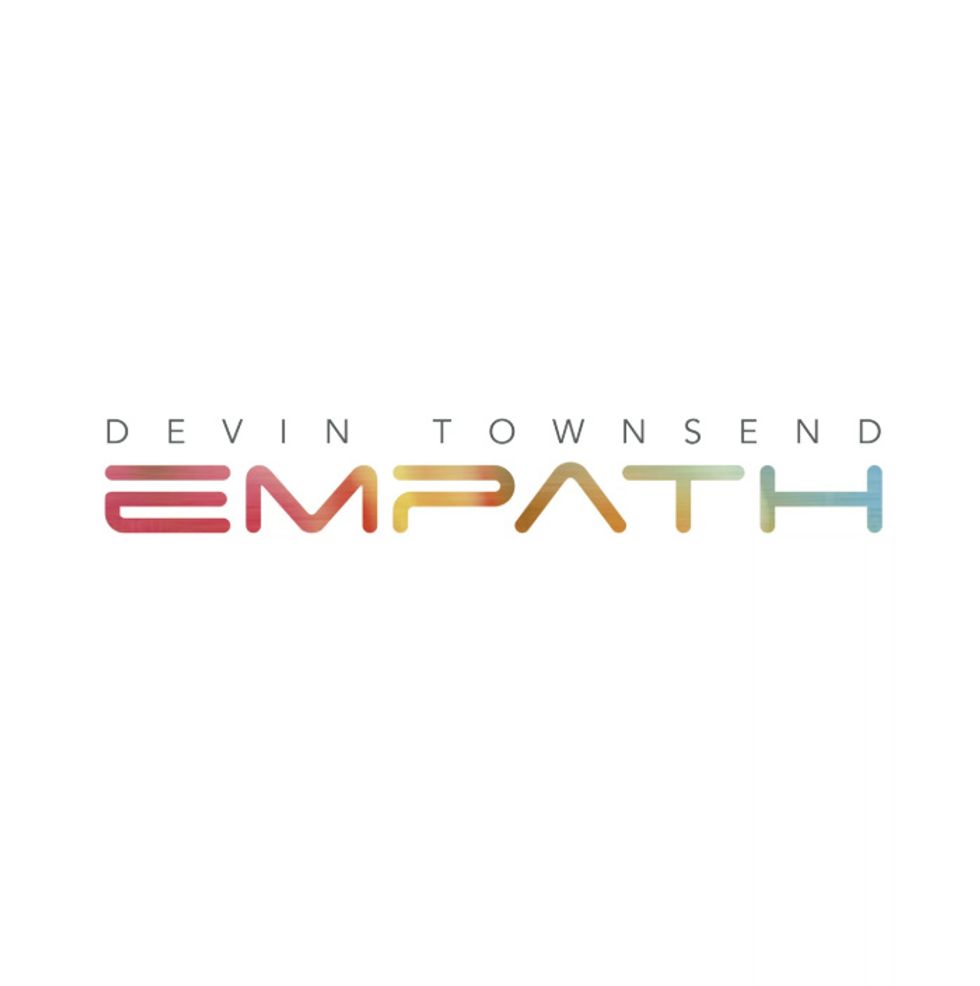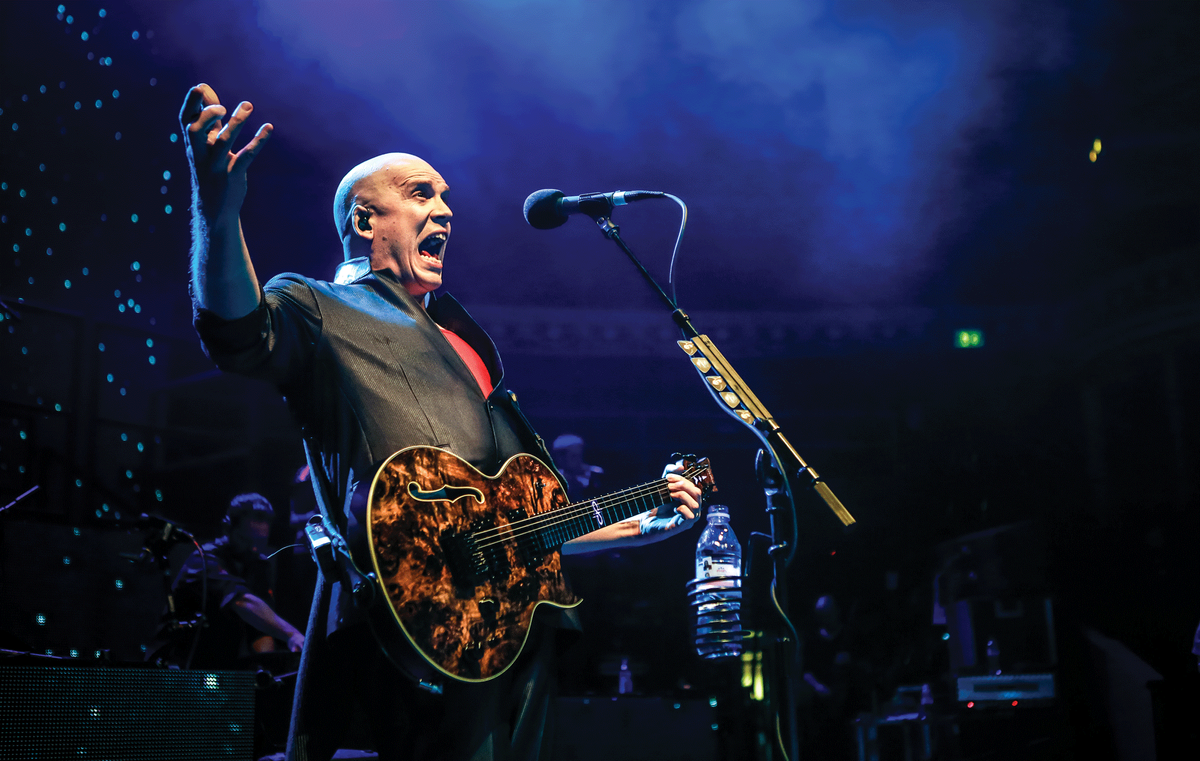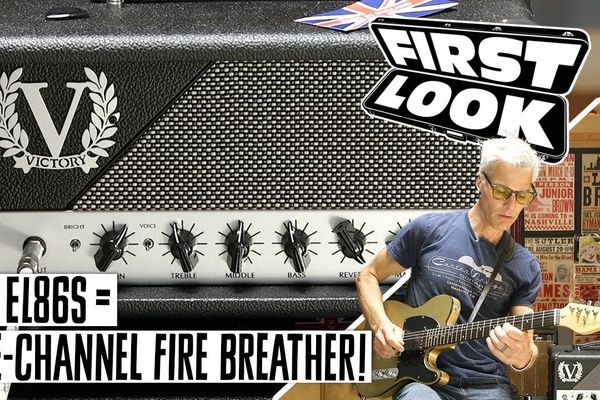Townsend emotes onstage at London's Royal Albert Hall in 2015, rocking a custom Framus that he's now traded in favor of his newer signature models by the company, which come in 6- and 7-string flavors.
On his epic new solo album, the metal-informed fret burner deploys signature gear, a vocal choir, A-listers including Steve Vai and Mike Keneally, and even kittens to create a highly orchestrated score for the chaos of life.
Devin Townsend's accomplishments are a roadmap of his talent and versatility. He famously sang lead for Steve Vai, blazed paths in extreme metal with Strapping Young Lad, created one of the most endearing storylines in prog-rock history with his alien tale—and 10th studio album—Ziltoid the Omniscient, and proved the depth of his creative well with a steady stream of equally beloved albums by his Devin Townsend Band and Devin Townsend Project. Add in his work in instrument design, production, his acoustic albums, and his stunning fretboard abilities, and it's easy to wonder if Townsend himself isn't some kind of omniscient alien of the guitar.
But back in January 2018, Townsend took a break from all of that—right at the height of the Devin Townsend Project's success. The band's 2016 album Transcendence was a DTP-fan favorite that charted in 13 countries and even resulted in a tour stop at the Ancient Roman Theater of Plovdiv, Bulgaria, to perform with the State Opera Plovdiv's orchestra and choir. So why did he put the group on hiatus?
Simply put, Townsend says that the music that was to become his 2019 album, Empath,was more than any rock band could hang with. “The parameters for being in a rock band are limited to what a rock band can achieve," Townsend explains. “It just had certain limitations—even on a technical front."
One spin through his new Empath and you'll agree the album is something no quartet of rockers alone could deliver. You'll find yourself in awe of the brilliant orchestral arrangements, astounded by Townsend's ever-increasing vocal range, and dissecting each song's vast architecture. But Townsend still places his jackhammer riffing, sheer dexterity, and earworm guitar work front and center.
Nowhere is this more apparent than on the album's first single, “Genesis." Serving as an overture of sorts, “Genesis" is like riding an out-of-control rocket through a soundscape of symphonic blasts, insanely intense death metal, disco, and meowing kittens. Yes, you read that correctly. Meowing kittens. More on that in a bit. Now, separate each of those disparate elements into their own songs, and you have a general idea of what you're in for on the rest of the album.
But Townsend didn't reach these expanses alone. In a recording process reminiscent of Steely Dan's lauded work, he reached out to a large group of artists and players to bring his vision to life. With this dream team—which included YouTube stars Samus Paulicelli and Nathan Navarro, Steve Vai, rock 'n' roll renaissance man Mike Keneally, metal super-producer Adam “Nolly" Getgood, and even Nickleback's Chad Kroeger—in place, Townsend had the tools and inspiration he needed to complete his masterpiece.
Throughout Empath, Townsend is chasing the narrative of embracing life fully: the good and the bad, the beautiful and the ugly, the serene and the violent. You'll find animal metaphors appearing in the songs and music videos to help illustrate such experiences. But it's Townsend's ability to marry transcendent beauty and unrelenting brutality into one fully realized vision that truly drives it all home. He was more than happy to spend time with Premier Guitar unpacking the massive undertaking necessary to create his new artistic statement.
What inspired the new direction?
It has been a few albums coming now, to be honest. But one thing that has always been foremost in my mind—when it comes to creating new content—is to follow it where it wants to lead me. By doing that, it takes me to places that are of emotional authenticity. That's what I'm looking for, more than almost anything.
If the directions that I'm being led are such that, with the amount of compromises I'm going to have to make with the current outfit, I'll be beating my head against the wall or end up doing it all myself anyway, it ceases to make sense. That's really what it came down to.
Another huge part of this story are all the people that you had play on the album. Why reach out to so many others to realize your vision?
I think midlife, I got to the point where I didn't want to compromise. For example, [in the past] I might say, “I really want to get a good choir. But it's going to be too expensive, so I'll do it myself." This time, I was like, “No. Fuck it. Let's get a good choir."
When it comes to these players, I really was determined from the very beginning that I wanted to make a statement that allowed me to use it as almost like a “best-of" of new material. To do that with the most uncompromising vision seemed like my path right now.
The guest that really stood out to me was Mike Keneally. What did he bring to Empath?
Mike and I met maybe a year before I started Empath. He was staying with me, and we were writing a bunch of other material, separate from Empath. [Later] he gave me a call and said, “Maybe we should try writing again." I said, “Well, I'd love to write, but my mind is so much on this [Empath]. But I'd like to show you some of this material."

TIDBIT: Despite amassing an impressive armada of amps and cabinets, Townsend recorded his guitar DI and then ran the tracks through an Axe-Fx amp and effects processor to nail his desired sounds.
Then, as I started playing it, he got such great ideas. He's like, “That section would be cool there if you made the bass louder." Or, “That section there would be really cool if you did this or that." And because of his freedom with his ideas and the depth of his musicality, I found it really, really fun. It was like I've created this music that could act as a playground.He really was responsible for bringing a lot of dynamic things into the individual songs that I was thrilled about. He took the vision, which was there, and the songs, which were there, and he made them better.
Did he play on the album?
He did a couple of melodic things. In “Hear Me," there's a thing right before the second chorus where Chad comes in. That was him playing. I told him I wanted to have something that sounded like it was tripping. He got me to sing my idea, and then he transcribed it and turned it into this really cool part.
You've always been very forward thinking when it comes to the gear you use. And I know you've been using an Axe-Fx recently. Is that what you tracked with?
Well, it's funny, man. What I did this time is, I decided I was going to go to the best studio in town. We got every amplifier I've ever wanted. I'll rent them, I'll borrow them, and I've got a lot of amplifiers. And I'll get every cab that I hear is a good cab around town, with all the mics and all the preamps. I'm going to set it up, I'm going to take a full day, I'm going to go through every one of them, and I'm going to get the best guitar sound that I can find.
At the end of it, I had this combination of a Dual Rectifier with a Tube Screamer in front, and then the EVH 5150 III. I had a Bogner, a Soldano, this LAA Custom, Marshalls, and blah, blah, blah. I got a wicked big sound, then tracked the whole album. But I tracked it with a DI.
Then when I tried to incorporate this big sound with all this other crap that I had put on the record, like orchestras, choirs, and synths, it was too big! So I took performances home and re-amped them through the Fractal [Axe-Fx III]. I was able to get the same amplifier models and the same cabinet models, but captured in a way that worked with this massive thing I was creating.
Watch our Rig Rundown with the hilarious Devin Townsend:
You have some signature gear: the Framus Stormbenders, the Fishman pickups, and the Mooer Ocean Machine. Did those make appearances on the album?
Yes. And with Prestige Guitars, based out of Vancouver, we have an acoustic called the Empath. On the record, all I used was the Framus, the Prestige, and those Fishman pickups. Actually, I stand corrected. I used a Strat on the beginning of “Singularity," because it had a whammy bar. And I also used the EverTune bridges.
The thing is, when I get together with these companies to create things, they've got a real specific function. They're meant to cover a real particular type of ground for me. My needs are so specific that once I get what I want from a gear company, I've got zero desire to change it. In fact, that's why the Axe-Fx works so well for me. I'm working on a signature amplifier with an Italian company right now, but it functions in unison with the Axe-Fx.
Do you also stick to specific picks and strings?
Yes, absolutely. I've been using D'Addario .010–.052 XLs for 40 years. They sent me the New York ones, and I went back to the old ones. In every tuning, too! Open C, open B, standard—it's all .010–.052s. For picks, I use Dunlop. I typically use Tortex .73, but the big bass ones. The pizza slice. I just had them make me a 1 mm set of pizza slice Ultex picks. I'm trying those right now. I like them, but I'm on the fence about whether or not I'll stick with them. I really like the sound of a worn pick—that's frayed on the side. In fact, I talked to Dunlop about making those, but we couldn't figure out a process to do it. When I'm playing on a clean guitar, it sounds like there's an overdrive, almost. Ultex are too shiny and hard. They sound great, but they don't have that grit that comes from a worn pick.
What really struck me the first time I listened to Empath are the repeating themes: whether it's a melodic statement, the sound of kittens, or the island feel. Tell me about the overarching narrative of the album.
Well, I think there is a narrative, for sure, that acts as a metaphor for what the absolute theme of the record is. The island is a metaphor for the mind of the protagonist. The protagonist is ultimately trying to find his way out of the ideas of duality, where there's monsters and/or animals, good versus evil, or any of these sorts of things. He's trying to transcend that in some way so he can observe these things and then understand his nature in relationship to them.
The actual theme is, life is chaos. To deny the fact that there's horror makes depression and the things that a lot of us suffer through that much more difficult. Through the chaos of it all, the thing that allows us to persevere is the awareness that other people are having to contend with the same thing, and empathy is the anchor to that.
So, what is with the kittens?
Kittens are awesome. [Laughter.]They are, man. I think they're awesome. I also love cows and octopi. One thing I think is really funny is that I've been doing this for so long, and I'm very conscious of trying to articulate myself in ways that don't leave a lot of gray area. What that forces you to do is to rationalize some things like, “Yes, kittens are cute." So there you go. [Laughs.]
Using the kitten meows in “Genesis" and the whimsical feel of the orchestra on “Why?" as examples, you seem to have distanced yourself from the metal tag. But there's stuff on Empath that could have easily been on Strapping Young Lad's 1997 album, City.
It's interesting to talk about it, because I don't think I've ever consciously tried to distance myself from [metal]. It didn't seem appropriate at a particular point. I think there is a tendency with metal bands who are getting older to try to say, “We never liked metal really. Even though we did death metal for 10 years, now we want to be Radiohead." I can certainly appreciate that. But for me, metal plays into my process like any other color. It's an emotional tool in order to articulate heavy emotions.

Guitars
Framus Stormbender Devin Townsend Signature 6-string
Framus Devin Townsend Stormbender 7-string
Framus custom Plank
Prestige Devin Townsend Empath signature dreadnought
Amps
Fractal Axe-Fx III
Effects
Mooer Ocean Machine
Strings and Picks
D'Addario XL (.010–.052)
Jim Dunlop Tortex .73 mm
Being well-versed in it is very important for my creative process. It allows me to draw on something that is visceral in a way that is rooted in authenticity. I think that's very important for what Empath was, because what it centered around was coming to terms with certain parts of my personality that perhaps I was afraid of. Really digging into that heavy stuff on this one—with the theme being what it is—allows me to relegate that part of my personality into something that's a healthy part of being an artist and recognize that's part of what I do. This is not something to be feared. It's not something to try and eliminate. It's a tool. Maybe over the past few years, I have lost sight of that.
When I hear how you combine death-metal tones and riffs with a beautiful orchestra on “Singularity," the metal seems to exist as a specific color for an emotional purpose. It's not simply a statement of aggression. Is that what you mean?
Exactly. That's where, emotionally, it's different than Strapping. On [2005's] Alien, it was a tool that I had learned, but I was using it in accordance with me being furious. It's not that I'm not angry. It's now. I'm older. It's a different way that, as a 47-year-old, I express my frustrations or express my anger. There's no manipulating that so you can, all of a sudden, pretend you're 23 again.
In fact, when I see artists do that—“Well, here's me pretending I was what I was at one point"—it always seems disingenuous. That doesn't mean you can't utilize the same tool. It's just that you're going to be using it to build something different.
With so many colors on the album, the scope of Empath is immense. How are you going to take this live and do you already have musicians in mind for the tour?
The plan is to put it over multiple tours, starting with this acoustic one. I've spent so much time with click tracks and backing tracks and all the stuff that it began to feel very stale to me. With this tour, I wanted to strip it back to acoustic and then start to build.
Then, in November, December, I've got a group of people together that is going to be completely different from anything I've done. It will be different types of players. There will be maybe seven or eight people onstage, and a lot of improvisation.
Then, for the consequent tours, I might do a really heavy one, I might do one that's choral…. I might do a lot of things. By the time we get to playing Empath in its entirety in 2021, my hope is that each one of these tours will have taught me a facet of what I need to do to pull it off perfectly. Even this acoustic tour has taught me so much about singing that will be invaluable by the time I get to that.
The album is an incredibly bold statement from an artist known for bold statements. How has the public reacted?
Well, I thought it wasn't going to be accepted. But contrary to my fears, I'm cautiously optimistic in saying this record's been received better than any others I've done. It's very empowering. because it allows me to trust my intuition more than I have.
You mentioned the album as being a midlife crisis of sorts. Now that it's out there, do you feel like you've scratched that itch, or is this the direction we can expect from you for a while?
No. This is where Devin was. Where I'm going next is going to be significantly different … I think.
Here's a song from the Devin Townshend Project's 2017 performance at the Ancient Roman Theater in Plovdiv, Bulgaria, with a gorgeous, soaring solo that starts at 2:53. It sounds like a precursor to the thoroughly orchestrated Empath album.

